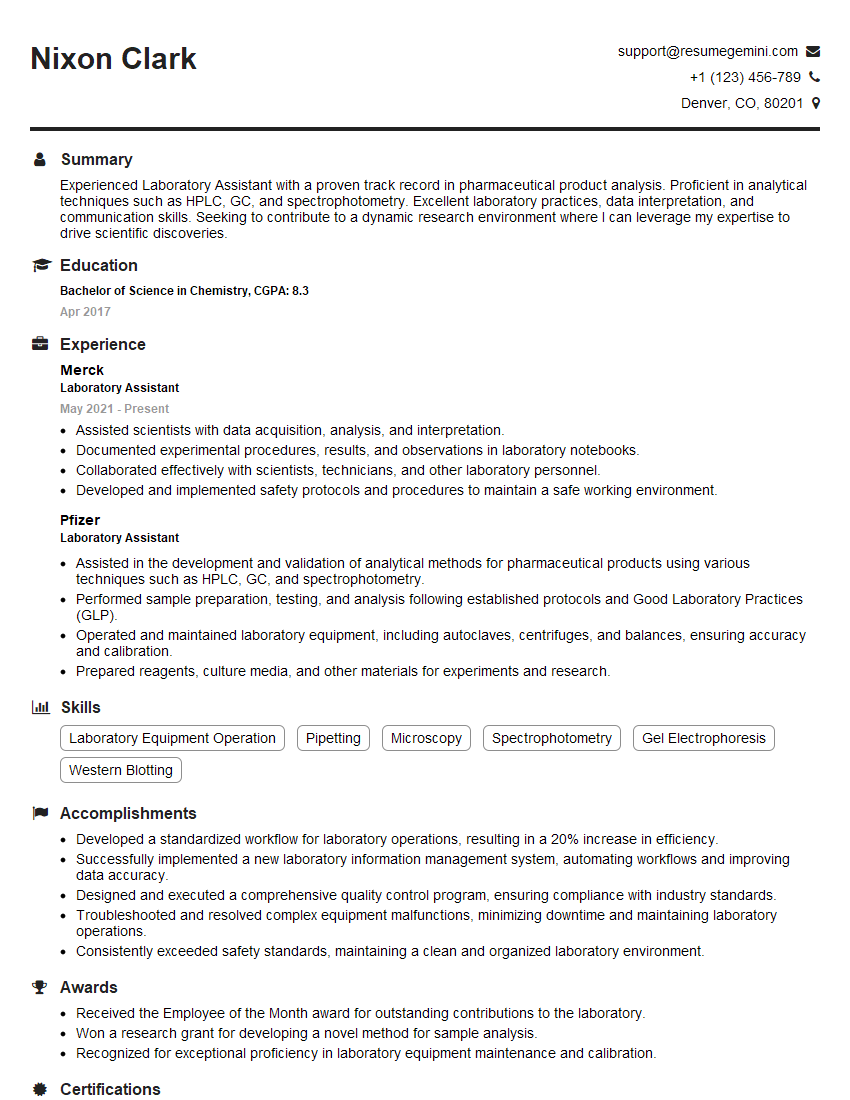Are you a seasoned Laboratory Assistant seeking a new career path? Discover our professionally built Laboratory Assistant Resume Template. This time-saving tool provides a solid foundation for your job search. Simply click “Edit Resume” to customize it with your unique experiences and achievements. Customize fonts and colors to match your personal style and increase your chances of landing your dream job. Explore more Resume Templates for additional options.

Nixon Clark
Laboratory Assistant
Summary
Experienced Laboratory Assistant with a proven track record in pharmaceutical product analysis. Proficient in analytical techniques such as HPLC, GC, and spectrophotometry. Excellent laboratory practices, data interpretation, and communication skills. Seeking to contribute to a dynamic research environment where I can leverage my expertise to drive scientific discoveries.
Education
Bachelor of Science in Chemistry
April 2017
Skills
- Laboratory Equipment Operation
- Pipetting
- Microscopy
- Spectrophotometry
- Gel Electrophoresis
- Western Blotting
Work Experience
Laboratory Assistant
- Assisted scientists with data acquisition, analysis, and interpretation.
- Documented experimental procedures, results, and observations in laboratory notebooks.
- Collaborated effectively with scientists, technicians, and other laboratory personnel.
- Developed and implemented safety protocols and procedures to maintain a safe working environment.
Laboratory Assistant
- Assisted in the development and validation of analytical methods for pharmaceutical products using various techniques such as HPLC, GC, and spectrophotometry.
- Performed sample preparation, testing, and analysis following established protocols and Good Laboratory Practices (GLP).
- Operated and maintained laboratory equipment, including autoclaves, centrifuges, and balances, ensuring accuracy and calibration.
- Prepared reagents, culture media, and other materials for experiments and research.
Accomplishments
- Developed a standardized workflow for laboratory operations, resulting in a 20% increase in efficiency.
- Successfully implemented a new laboratory information management system, automating workflows and improving data accuracy.
- Designed and executed a comprehensive quality control program, ensuring compliance with industry standards.
- Troubleshooted and resolved complex equipment malfunctions, minimizing downtime and maintaining laboratory operations.
- Consistently exceeded safety standards, maintaining a clean and organized laboratory environment.
Awards
- Received the Employee of the Month award for outstanding contributions to the laboratory.
- Won a research grant for developing a novel method for sample analysis.
- Recognized for exceptional proficiency in laboratory equipment maintenance and calibration.
Certificates
- Certified Laboratory Assistant (CLA)
- Medical Laboratory Technician (MLT)
- American Society for Clinical Pathology (ASCP) Certification
- National Accrediting Agency for Clinical Laboratory Sciences (NAACLS) Certification
Career Expert Tips:
- Select the ideal resume template to showcase your professional experience effectively.
- Master the art of resume writing to highlight your unique qualifications and achievements.
- Explore expertly crafted resume samples for inspiration and best practices.
- Build your best resume for free this new year with ResumeGemini. Enjoy exclusive discounts on ATS optimized resume templates.
How To Write Resume For Laboratory Assistant
- Highlight your relevant laboratory skills and experience, showcasing your proficiency in analytical techniques and instrumentation.
- Quantify your accomplishments using specific metrics to demonstrate your impact on projects or research initiatives.
- Emphasize your attention to detail and adherence to safety protocols to convey your commitment to quality and accuracy.
- Tailor your resume to each job application, emphasizing the skills and experiences that align with the specific requirements of the role.
Essential Experience Highlights for a Strong Laboratory Assistant Resume
- Assisted in the development and validation of analytical methods for pharmaceutical products using various techniques such as HPLC, GC, and spectrophotometry.
- Performed sample preparation, testing, and analysis following established protocols and Good Laboratory Practices (GLP).
- Operated and maintained laboratory equipment, including autoclaves, centrifuges, and balances, ensuring accuracy and calibration.
- Prepared reagents, culture media, and other materials for experiments and research.
- Assisted scientists with data acquisition, analysis, and interpretation.
- Documented experimental procedures, results, and observations in laboratory notebooks.
- Collaborated effectively with scientists, technicians, and other laboratory personnel.
Frequently Asked Questions (FAQ’s) For Laboratory Assistant
What are the primary responsibilities of a Laboratory Assistant?
Laboratory Assistants assist scientists and researchers in conducting experiments, performing analyses, and maintaining laboratory equipment. They may prepare reagents, conduct sample testing, operate specialized instrumentation, and assist with data collection and analysis.
What qualifications are typically required for a Laboratory Assistant position?
Laboratory Assistants typically hold a bachelor’s degree in a science-related field, such as chemistry, biology, or engineering. They may also have experience working in a laboratory setting or completing internships in research labs.
What are the career prospects for Laboratory Assistants?
Laboratory Assistants can advance their careers by pursuing higher education, such as a master’s degree or Ph.D. They may also specialize in a particular area of research or become laboratory managers or supervisors.
What is the work environment like for Laboratory Assistants?
Laboratory Assistants typically work in research laboratories, hospitals, or industrial settings. They may work independently or as part of a team, and they may be required to work overtime or on weekends to meet deadlines.
What are the key skills required to be a successful Laboratory Assistant?
Laboratory Assistants should have strong technical skills, including proficiency in laboratory equipment and techniques. They should also have good communication and interpersonal skills, as they may need to work with scientists, researchers, and other laboratory personnel.
What are the highest-paying industries for Laboratory Assistants?
Laboratory Assistants can earn higher salaries in industries such as pharmaceuticals, biotechnology, and healthcare. They may also earn higher salaries in research-intensive universities and government agencies.
What are the job titles related to Laboratory Assistants?
Laboratory Assistants may also be referred to as Laboratory Technicians, Research Assistants, or Laboratory Analysts.